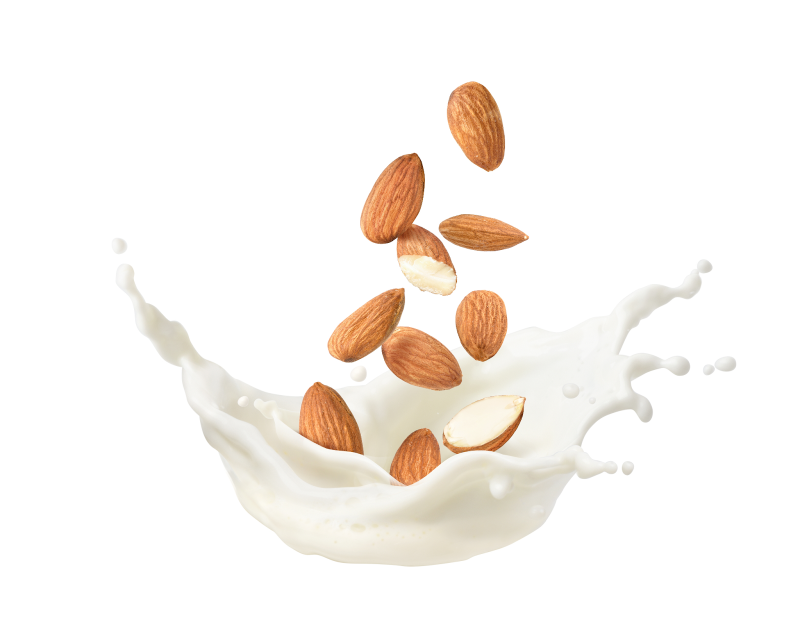
Almond milk is one of the most popular milk alternatives in the U.S. and is widely available all over the country with dozens of different flavors and formulations. Although you may be surprised to know that almond milk has actually been around since the Middle Ages, it was a pretty niche food item up until the 2000s, when sales reached an increase of almost 80% by the year 2011. But why is it so popular now?
In this article, we’re going to discuss the benefits of drinking almond milk and why you might consider making the switch in your diet.
What is Almond Milk?
Almond milk is a plant-based milk substitute. Almonds themselves are originally from the Middle East but are now available all over the world. They are commonly enjoyed as a healthy snack or ground into flour and are also the main ingredient in almond milk.
Almond milk is made by soaking the almonds in water for an extended period of time and grinding them down or throwing them in a blender, followed by straining out the pulp or skin of the almond. The white milky liquid that is left over once the pulp is removed is the final product, though it can be sweetened by adding honey or other sweeteners.
It can also be made by adding a certain amount of almond butter to water though this is not the most common method. Generally, it can be stored in a refrigerator for almost a week but should not be kept for longer than 5 days. It can be drunk plain or used in recipes as an alternative to cow milk or any other sort of plant-based alternative milk.
It’s Dairy Free
Obviously, it’s dairy free, which is one of the main reasons many choose almond milk as a substitute for cow milk. Though some avoid dairy due to a dietary or lifestyle preference such as veganism, many suffer from a condition known as lactose intolerance.
Lactose is a naturally occurring sugar found in dairy products, but since almond milk is not made from animal products and does not contain lactose, it is a safe option for those with this unfortunate condition.
It Can Be Low in Carbs and Calories
A large percentage of the population that chooses to drink almond milk often do so as a means to either eat healthier or follow a specific diet plan. An example of this would be the Keto Diet which expressly forbids consuming carbs almost entirely.
This begs the question, does almond milk have carbs? Well, as long as you buy the unsweetened kind, almond milk can be extremely low in calories, added sugars, and carbs making it keto-friendly depending on your daily carb allowance and the type of almond milk you choose.
It’s Rich in Magnesium
Most Americans today are extremely deficient in trace minerals as well as macro minerals. One of the most common deficiencies we see is magnesium deficiency. This vital nutrient is paramount for the healthy function of muscles, blood sugar, blood pressure, and the production of bone.

Almond milk, as it turns out, is quite rich in magnesium, containing roughly 17 grams per 8 ounces. Though this is still well below the daily recommended intake, it is an impressive amount for a milk substitute and can help you reach that goal.
It Contains High Amounts of Vitamin E
Vitamin E is an important antioxidant that aids the function of the immune system as well as the blood vessels. Antioxidants also help to protect the cells from free radicals, which can be dangerous if high amounts accumulate in the body.
Though it is rare in most parts of the world to encounter a vitamin E deficiency, a high intake of Vitamin E has also been shown to reduce the risk of certain diseases that are cognitive in nature, such as Alzheimer’s disease.
Good Source of Calcium
Let’s be honest, most of us are not going to be making almond milk at home. For those of you that do, more power to you. But for the vast majority, we will typically be getting out almond milk at the grocery store. On top of it being more convenient, many commercial brands fortify their almond milk with vitamins and nutrients such as calcium.
Bone health is incredibly important for obvious reasons, and calcium makes up much of the bone structure. Getting enough calcium in your diet is imperative to a strong and healthy bone structure and can also help to prevent osteoporosis.
It May Also Contain Other Vital Minerals
As previously mentioned, many commercial brands fortify their almond milk with vital nutrients that may entice the buyer to choose their product over the competitors. A few of these additional macronutrients can include:
- Manganese
- Phosphorus
- Vitamin A
- Vitamin D
- Copper
- Iron
Be sure to read the nutritional labels to make an informed decision.
Beware of Certain Risks
As with all processed foods and really anything you consume, it may not be suitable for everyone, and there are certain risks to consuming almond milk for some people. Here are some of the drawbacks.
Nut Allergies
If you are allergic to tree nuts, it’s best to avoid drinking almond milk, as this could cause an unpleasant or life-threatening reaction. If you’ve never consumed any sort of tree nut before or you have an allergy to any other type of nut, you can go to your doctor to request an allergy panel. Better safe than sorry.
Minimal Protein
Almond milk is extremely low in protein, clocking in at only 1 gram for every 8 ounces. This means you will have to fill your protein quota with other foods or supplementation, which can become difficult if you struggle to eat large volumes of food and drink.
Not Safe for Babies
Almond milk is not recommended for infants 12 months or younger due to the low protein available in almond milk.
Summary
To recap, almond milk is a plant-based milk substitute made from almonds and water. It can be sweetened and fortified with vital nutrients and has many health benefits. This includes being dairy free i.e., lactose-free, low in calories, sugar, and carbs, rich in magnesium, Vitamin E, and calcium, and you can even find brands that add manganese, phosphorus, vitamin A, vitamin D, copper, and iron.
Additionally, though there are many health benefits, there are also risks for certain people. Those with nut allergies as well as infants under 12 months old, should not partake. It’s also incredibly low in protein, so you’ll have to use other means to reach your daily protein intake.
















